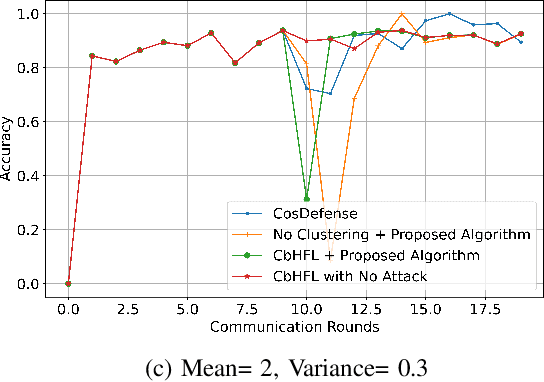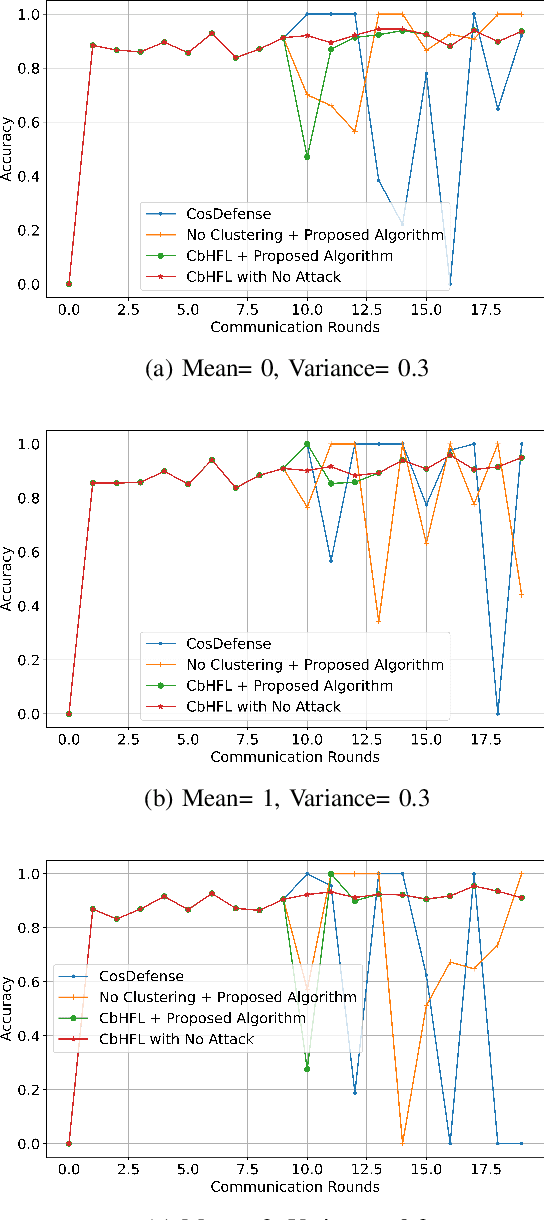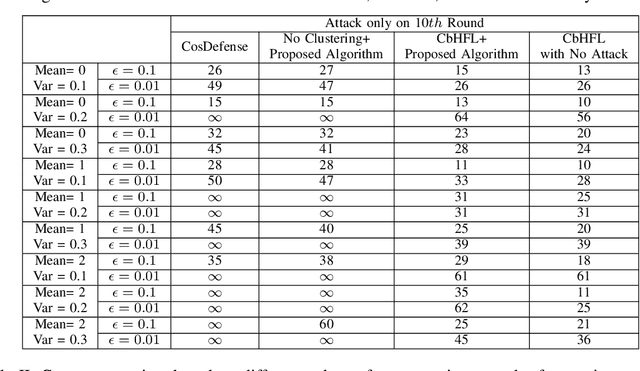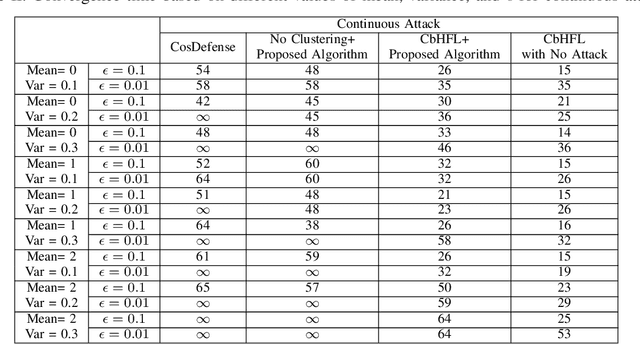M. Saeid HaghighiFard
Secure Cluster-Based Hierarchical Federated Learning in Vehicular Networks
May 02, 2025Abstract:Hierarchical Federated Learning (HFL) has recently emerged as a promising solution for intelligent decision-making in vehicular networks, helping to address challenges such as limited communication resources, high vehicle mobility, and data heterogeneity. However, HFL remains vulnerable to adversarial and unreliable vehicles, whose misleading updates can significantly compromise the integrity and convergence of the global model. To address these challenges, we propose a novel defense framework that integrates dynamic vehicle selection with robust anomaly detection within a cluster-based HFL architecture, specifically designed to counter Gaussian noise and gradient ascent attacks. The framework performs a comprehensive reliability assessment for each vehicle by evaluating historical accuracy, contribution frequency, and anomaly records. Anomaly detection combines Z-score and cosine similarity analyses on model updates to identify both statistical outliers and directional deviations in model updates. To further refine detection, an adaptive thresholding mechanism is incorporated into the cosine similarity metric, dynamically adjusting the threshold based on the historical accuracy of each vehicle to enforce stricter standards for consistently high-performing vehicles. In addition, a weighted gradient averaging mechanism is implemented, which assigns higher weights to gradient updates from more trustworthy vehicles. To defend against coordinated attacks, a cross-cluster consistency check is applied to identify collaborative attacks in which multiple compromised clusters coordinate misleading updates. Together, these mechanisms form a multi-level defense strategy to filter out malicious contributions effectively. Simulation results show that the proposed algorithm significantly reduces convergence time compared to benchmark methods across both 1-hop and 3-hop topologies.
Secure Hierarchical Federated Learning in Vehicular Networks Using Dynamic Client Selection and Anomaly Detection
May 25, 2024



Abstract:Hierarchical Federated Learning (HFL) faces the significant challenge of adversarial or unreliable vehicles in vehicular networks, which can compromise the model's integrity through misleading updates. Addressing this, our study introduces a novel framework that integrates dynamic vehicle selection and robust anomaly detection mechanisms, aiming to optimize participant selection and mitigate risks associated with malicious contributions. Our approach involves a comprehensive vehicle reliability assessment, considering historical accuracy, contribution frequency, and anomaly records. An anomaly detection algorithm is utilized to identify anomalous behavior by analyzing the cosine similarity of local or model parameters during the federated learning (FL) process. These anomaly records are then registered and combined with past performance for accuracy and contribution frequency to identify the most suitable vehicles for each learning round. Dynamic client selection and anomaly detection algorithms are deployed at different levels, including cluster heads (CHs), cluster members (CMs), and the Evolving Packet Core (EPC), to detect and filter out spurious updates. Through simulation-based performance evaluation, our proposed algorithm demonstrates remarkable resilience even under intense attack conditions. Even in the worst-case scenarios, it achieves convergence times at $63$\% as effective as those in scenarios without any attacks. Conversely, in scenarios without utilizing our proposed algorithm, there is a high likelihood of non-convergence in the FL process.
Hierarchical Federated Learning in Multi-hop Cluster-Based VANETs
Jan 18, 2024Abstract:The usage of federated learning (FL) in Vehicular Ad hoc Networks (VANET) has garnered significant interest in research due to the advantages of reducing transmission overhead and protecting user privacy by communicating local dataset gradients instead of raw data. However, implementing FL in VANETs faces challenges, including limited communication resources, high vehicle mobility, and the statistical diversity of data distributions. In order to tackle these issues, this paper introduces a novel framework for hierarchical federated learning (HFL) over multi-hop clustering-based VANET. The proposed method utilizes a weighted combination of the average relative speed and cosine similarity of FL model parameters as a clustering metric to consider both data diversity and high vehicle mobility. This metric ensures convergence with minimum changes in cluster heads while tackling the complexities associated with non-independent and identically distributed (non-IID) data scenarios. Additionally, the framework includes a novel mechanism to manage seamless transitions of cluster heads (CHs), followed by transferring the most recent FL model parameter to the designated CH. Furthermore, the proposed approach considers the option of merging CHs, aiming to reduce their count and, consequently, mitigate associated overhead. Through extensive simulations, the proposed hierarchical federated learning over clustered VANET has been demonstrated to improve accuracy and convergence time significantly while maintaining an acceptable level of packet overhead compared to previously proposed clustering algorithms and non-clustered VANET.
 Add to Chrome
Add to Chrome Add to Firefox
Add to Firefox Add to Edge
Add to Edge